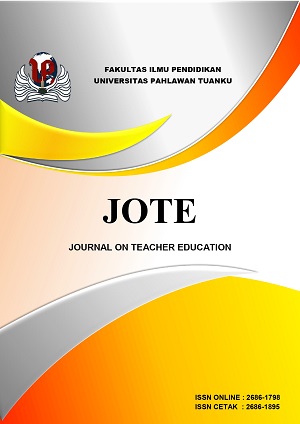Strategi Pengasuhan Anak Usia Dini di Era Teknologi Dengan Berbasis Literasi Digital
Abstract
Keywords
Full Text:
PDFReferences
Bornstein, M. H. (2015). Children’s parents. Handbook of Child Psychology and Developmental Science, 4, 55–132.
Dong, C., & Mertala, P. (2021). It is a tool, but not a ‘must’: Early childhood preservice teachers’ perceptions of ICT and its affordances. Early Years, 41(5), 540–555.
Gutica, M., & Conati, C. (2013). Student emotions with an edu-game: A detailed analysis. Proceedings - 2013 Humaine Association Conference on Affective Computing and Intelligent Interaction, ACII 2013, 534–539. https://doi.org/10.1109/ACII.2013.94
Hadi, S., Setiawati, L., Kirana, K. C., Lada, S. Bin, & Rahmawati, C. H. T. (2024). The effect of digital leadership and organizational support on innovative work behavior: The mediating role of emotional intelligence. Calitatea, 25(199), 74–83.
Khaironi, M., & Ramdhani, S. (2017). Pendidikan karakter anak usia dini. Jurnal Golden Age, 1(02), 82–89.
Livingstone, S., & Third, A. (2017). Children and young people’s rights in the digital age: An emerging agenda. In New media & society (Vol. 19, Issue 5, pp. 657–670). Sage Publications Sage UK: London, England.
Mulyani, M. P. (2018). Perkembangan anak usia dini. Bimbingan Konseling Anak Usia Dini, 46.
Putri, I., Mulyadi, A. I., Fajarini, S. D., & Eriyansyah, R. (2023). Transformasi Digital Umkm Kota Palembang. Jurnal Ilmu Komunikasi Balayudha, 3(1), 28–40.
Radesky, J. S., Schumacher, J., & Zuckerman, B. (2015). Mobile and interactive media use by young children: the good, the bad, and the unknown. Pediatrics, 135(1), 1–3.
Rahmawati, I. (2022). Pengaruh Penggunaan Model Pembelajaran Abad 21 Terhadap Kemampuan Kognitif Peserta Didik Sekolah Dasar. Edusaintek: Jurnal Pendidikan, Sains Dan Teknologi, 9(2), 404–418.
Sari, N., Dayurni, P., & Nur, M. (2023). Pengembangan Edu-Game dalam Meningkatkan Kesadaran Mitigasi Bencana untuk Anak Usia Dini. Murhum: Jurnal Pendidikan Anak Usia Dini, 4(2), 555–567.
Yuliani, T., Kurniawati, N., & Siswayani, P. (2023). Engaging Indonesian students in “read, reread, list, compose” strategy to enhance paraphrasing skill. Journal of Education and Learning (EduLearn), 17(2), 195–205.
DOI: https://doi.org/10.31004/abdira.v5i4.963
Refbacks
- There are currently no refbacks.
Copyright (c) 2025 Novita Sari

This work is licensed under a Creative Commons Attribution-ShareAlike 4.0 International License.





1.png)
